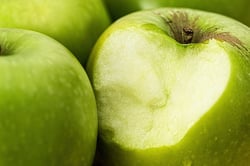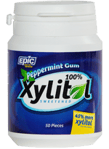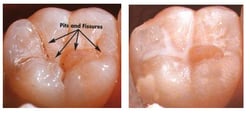
Child tooth decay in Australia dropped dramatically after 1979 but has been rising steadily again since 2000.
The three main causes:
- Expense of dental care – resulting in viewer visits to the dentist
- Increased sugar intake in the average diet
- Popularity of bottled water – we may have fluoride in our tap water but it’s of little use if it’s not being drunk
Even if you police your children’s oral hygiene routine, ensuring they brush twice a day (and floss/use mouthwash for extra bonus points!), even if you foot the bill for regular dental check-ups and limit their sugar intake, your kids may still be susceptible to caries.
My nine-year-old is filling free but my five-year-old has already had a cavity filled in a milk tooth. Same genes, same diet, same oral hygiene program supervised by yours truly … but the little one has closer-packed teeth in a smaller jaw (at least that was the explanation my dentist gave me).
Assuming your child maintains a good relationship with a toothbrush and receives regular check-ups, here are seven additional ways to keep their healthy smile …
Drink water liberally
Tap water has a pH of 7, meaning that it is entirely neutral with no acid or alkali. Water washes away leftover food and dilutes the acids produced by bacteria in your mouth.
Despite its detractors, fluorinated water has a proven benefit of protecting teeth from decay. A study into child dental health in Logan-Beaudesert showed a reduction of 19% in child tooth decay just 36 months after the 2008 introduction of water fluoridation in Queensland.
Use a straw
On the occasions when your child does drink sugary beverages, such as fruit juice or fizzy drinks, encourage them to use a straw to reduce direct contact of sugar with teeth.
Use "nature's toothbrushes"
Apples, raw carrots, celery and even unsweetened popcorn help to clean teeth as they’re eaten. Include some in your child’s lunchbox or place a cup of carrot and celery sticks on the dinner table.
Neutralise with cheese
After eating sugary food, have your child nibble on a chunk of cheese to neutralise the acid in their mouth. Eating cheese stimulates saliva production, which lowers acidity levels in the mouth and helps clear food particles. The calcium and phosphorus present in cheese stabilise the pH levels in the mouth and help remineralise the tooth enamel.
Up your calcium and phosphorous
Tooth enamel is the only part of the body that cannot repair itself. Keep tooth enamel strong with a diet rich in calcium and phosphorous. Calcium can be found in unsweetened dairy (milk, yoghurt etc), almonds and leafy greens. Phosphorous is present in meat, eggs, fish, seeds, beans and lentils.
Chew xylitol gum
 I’ll come clean. I don’t let my own kids to eat gum because they persist in swallowing it, dropping it on floors and sticking it in inconvenient places. However, if you can bear the sight and sound of chomping jaws, older children might benefit from chewing gum made with xylitol, a natural sugar substitute derived from the fibrous parts of plants.
I’ll come clean. I don’t let my own kids to eat gum because they persist in swallowing it, dropping it on floors and sticking it in inconvenient places. However, if you can bear the sight and sound of chomping jaws, older children might benefit from chewing gum made with xylitol, a natural sugar substitute derived from the fibrous parts of plants.
The bacteria that cause tooth decay cannot use xylitol to grow nor metabolise it to produce acid. Xylitol can help keep a neutral pH level in the mouth and prevent bacteria from sticking to the teeth.
It is important that Xylitol is the first ingredient listed in the chewing gum, as other ingredients (eg sorbitol, mannitol and aspartame) may counteract its benefits.
Consider fissure sealant
T he back, chewing teeth are the most common area for dental decay in children. Your dentist can put a plastic sealant in the natural grooves and pits of your child’s permanent molars to prevent cavities forming there. The effectiveness of sealants wears off over time from about 83% effective the first year to around 55% effective after seven years but they do offer protection against caries whilst intact. Per tooth, fissure sealants cost about a third of the price of a filling.
he back, chewing teeth are the most common area for dental decay in children. Your dentist can put a plastic sealant in the natural grooves and pits of your child’s permanent molars to prevent cavities forming there. The effectiveness of sealants wears off over time from about 83% effective the first year to around 55% effective after seven years but they do offer protection against caries whilst intact. Per tooth, fissure sealants cost about a third of the price of a filling.
Tooth enamel is the only part of the body that cannot repair itself. Using some of these tricks in your child’s day-to-day may help preserve their teeth for a lifetime.










